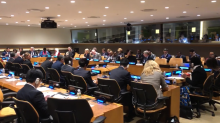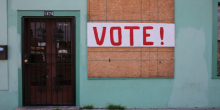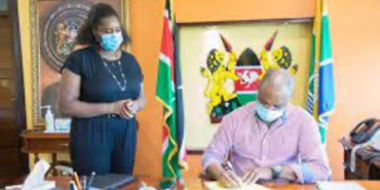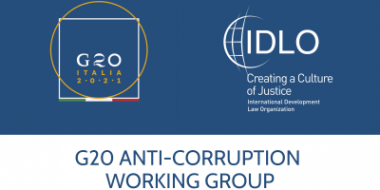Good Governance

By transferring resources from public to private hands, corruption negates the benefits of development. Similarly, favoritism and nepotism are the antithesis of fairness and equality. It is no coincidence that the most corrupt polities are also the poorest, most unequal and most justice-deficient. If the rule of law and development are to take hold, good governance is a necessary condition.
For this reason, IDLO has undertaken to expand its portfolio of integrity-focused projects. Promoting good governance is an area so broad as to be almost inexhaustible. In our case, it may mean helping countries make the institutions of justice cleaner and more responsive; reducing conflict of interest in procurement and public life; seeking to ensure adequate funding for the judiciary; or strengthening the capacity to fight fraud and economic crime.
In turbulent times, invest in justice and peace
“There are silver threads which the international community has woven into a tapestry known as the UN 2030 Agenda for Sustainable Development,” remarked IDLO’s Director-General Irene Khan at the opening of IDLO’s 2018 Partnership Forum. “At the heart of this tapestry is access to justice and the rule of law.”

Assembly of Parties and Partnership Forum 2018
The forthcoming Annual Meeting of the Assembly of Parties and Partnership Forum 2018 will take place on November 20 and 21, 2018.

UNGA73 | Stand up for SDG16+
73rd Session of the United Nations General Assembly: Stand up for SDG16+
STATEMENT OF THE INTERNATIONAL DEVELOPMENT LAW ORGANIZATION
United Nations Headquarters, New York
Delivered by Irene Khan, Director-General, IDLO

Postcards from prosecutors: Philippines Department of Justice
Prosecutors play a key role in keeping criminals off the streets. But in the Philippines, day-to-day challenges can significantly hamper their work. A severe shortage of staff has resulted in a heavy workload for existing prosecutors, with individuals spread thinly across multiple courts.

Dialogue on Electoral Justice: Exploring approaches for effective dispute resolution
Dialogue on Electoral Justice: Exploring approaches for effective dispute resolution

Kyrgyz Supreme Court publishes cases of alleged judicial interferences
The Supreme Court of the Kyrgyz Republic is now publicizing incidents of alleged out-of-process interferences in judicial activities online. The initiative represents an important measure in the context of the judiciary’s broader efforts to increase transparency and inform the public, and also works to prevent any undue influence or pressure on judges.

IDLO contributes to the Forum on Belt and Road Legal Cooperation
On July 2, 2018, The Ministry of Foreign Affairs of the People’s Republic of China convened the Forum on Belt and Road Legal Cooperation to increase legal exchange and cooperation between the countries and organizations involved in the ambitious '

IDLO seals partnership with Mexico’s Electoral Tribunal
IDLO and the federal Electoral Tribunal of Mexico have signed an agreement to expand their cooperative ties with a view to strengthening democratic processes and promoting the rule of law and access to justice.
Adopting a Fair Treatment Approach in Indonesia’s Ombudsman Offices
The Ombudsman of the Republic of Indonesia handles citizens’ complaints about public service delivery and maladministration. Often, similar complaints are filed, or citizens return with additional grievances, leading to the refiling of cases and extra legal and administrative costs. The Ombudsman of Indonesia seeks to improve its service delivery, its effectiveness when handling complaints and its relationship with citizens and other stakeholders.
Pages
Key Initiatives
-
 Until recently, court processes in the Kyrgyz Republic have not been automated. Manual or paper systems still are required and are the norm although automating all processes has started very actively. According the country’s National Target Program for Development of the Judiciary, automated information systems need to be expanded and rolled out to the whole judicial system, not only within all first instance courts, but also second and third instance courts.
Until recently, court processes in the Kyrgyz Republic have not been automated. Manual or paper systems still are required and are the norm although automating all processes has started very actively. According the country’s National Target Program for Development of the Judiciary, automated information systems need to be expanded and rolled out to the whole judicial system, not only within all first instance courts, but also second and third instance courts. -
 The Ombudsman of the Republic of Indonesia handles citizens’ complaints about public service delivery and maladministration. Often, similar complaints are filed, or citizens return with additional grievances, leading to the refiling of cases and extra legal and administrative costs. The Ombudsman of Indonesia seeks to improve its service delivery, its effectiveness when handling complaints and its relationship with citizens and other stakeholders.
The Ombudsman of the Republic of Indonesia handles citizens’ complaints about public service delivery and maladministration. Often, similar complaints are filed, or citizens return with additional grievances, leading to the refiling of cases and extra legal and administrative costs. The Ombudsman of Indonesia seeks to improve its service delivery, its effectiveness when handling complaints and its relationship with citizens and other stakeholders. -
 The Kyrgyz Republic has made significant strides in working toward improvements to a justice system shaken to the core following the 2010 Revolution. While a wholesale reselection process of judges changed the landscape and provided hope for real change, it also created a judiciary staffed with many inexperienced, under-skilled first-time judges who are more easily exposed to negative influences - both perceived and real. Consequently, the public mistrusts the judiciary and holds a negative perception of it being corrupt, inefficient and dependent on other branches of government.
The Kyrgyz Republic has made significant strides in working toward improvements to a justice system shaken to the core following the 2010 Revolution. While a wholesale reselection process of judges changed the landscape and provided hope for real change, it also created a judiciary staffed with many inexperienced, under-skilled first-time judges who are more easily exposed to negative influences - both perceived and real. Consequently, the public mistrusts the judiciary and holds a negative perception of it being corrupt, inefficient and dependent on other branches of government. -
Español | English: Mexico has made significant efforts to modernize its criminal justice system, specifically regarding public security and strengthening the rule of law. The current justice system, which entered into force in 2016, is based on the presumption of innocence and includes police professionalization as a public policy.
-
 Somalia’s economy remains heavily dependent on remittances from the Somali diaspora, which the International Monetary Fund estimates account for approximately 23 per cent of Somalia’s GDP. However, examining and supervising such transactions is difficult as Somalia’s formal banking sector is nascent and underdeveloped. Concerns over the lack of a basic, functioning, regulated financial sector and weak financial regulation and oversight, including customer identification measures, have eroded international confidence in Somalia’s financial firms.
Somalia’s economy remains heavily dependent on remittances from the Somali diaspora, which the International Monetary Fund estimates account for approximately 23 per cent of Somalia’s GDP. However, examining and supervising such transactions is difficult as Somalia’s formal banking sector is nascent and underdeveloped. Concerns over the lack of a basic, functioning, regulated financial sector and weak financial regulation and oversight, including customer identification measures, have eroded international confidence in Somalia’s financial firms.
Latest Activity
|
Publication
|
|
Policy Statements
|




